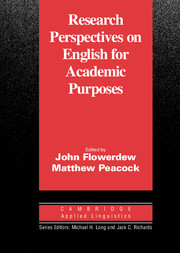Book contents
- Frontmatter
- Contents
- List of contributors
- Series editors' preface
- Preface
- I ISSUES IN ENGLISH FOR ACADEMIC PURPOSES
- Introduction to Part I
- 1 Issues in EAP: A preliminary perspective
- 2 Language use, language planning and EAP
- 3 EAP-related linguistic research: An intellectual history
- 4 Linguistic research and EAP pedagogy
- 5 International scientific English: The language of research scientists around the world
- 6 Discipline specificity and EAP
- 7 World Englishes: Issues in and from academic writing assessment
- 8 Addressing issues of power and difference in ESL academic writing
- 9 ‘I'll go with the group’: Rethinking ‘discourse community’ in EAP
- 10 EAP assessment: Issues, models, and outcomes
- II THE ENGLISH FOR ACADEMIC PURPOSES CURRICULUM
- References
- Index
9 - ‘I'll go with the group’: Rethinking ‘discourse community’ in EAP
Published online by Cambridge University Press: 05 October 2012
- Frontmatter
- Contents
- List of contributors
- Series editors' preface
- Preface
- I ISSUES IN ENGLISH FOR ACADEMIC PURPOSES
- Introduction to Part I
- 1 Issues in EAP: A preliminary perspective
- 2 Language use, language planning and EAP
- 3 EAP-related linguistic research: An intellectual history
- 4 Linguistic research and EAP pedagogy
- 5 International scientific English: The language of research scientists around the world
- 6 Discipline specificity and EAP
- 7 World Englishes: Issues in and from academic writing assessment
- 8 Addressing issues of power and difference in ESL academic writing
- 9 ‘I'll go with the group’: Rethinking ‘discourse community’ in EAP
- 10 EAP assessment: Issues, models, and outcomes
- II THE ENGLISH FOR ACADEMIC PURPOSES CURRICULUM
- References
- Index
Summary
Introduction
In the EAP literature, the notion of an academic discipline constituting an academic discourse community into which new students will be ‘inducted’ or ‘initiated’ through EAP-type courses, particularly writing courses, while bringing a welcome social dimension to the teaching and learning of writing, is of limited usefulness if it presupposes a homogenous, unconflictual discourse community from which the power relations shaping the wider social context are absent. Theoretical frameworks and instructional models which oversimplify reality (Zamel, 1993), may neither help prepare our students to negotiate the complex social worlds they are entering nor necessarily assist EAP practitioners in their own negotiations with faculty in the disciplines. My ethnographic research into the development of the academic writing of black, ESL students, in their first year of study in the sociology department at a South African university, has led me to interrogate some current conceptions of discourse community which do not allow for sufficient understanding of the ways in which social inequalities may be being reproduced within the discourse community.
Driving my research was a need to understand better the relative lack of success of black, ESL students entering the university after the exclusionary apartheid years. The discourse community metaphor appeared to provide a helpful conceptual framework: if I could come to understand the norms and conventions, both implicit and explicit, governing writing in the community, I would, as an EAP teacher be better able to assist students in becoming successful in Sociology One.
- Type
- Chapter
- Information
- Research Perspectives on English for Academic Purposes , pp. 132 - 147Publisher: Cambridge University PressPrint publication year: 2001
- 11
- Cited by

